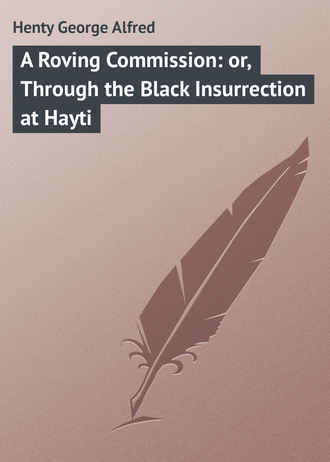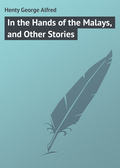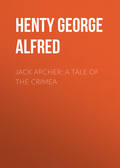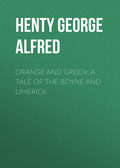
Henty George Alfred
A Roving Commission: or, Through the Black Insurrection at Hayti
Round the top was a deep hem through which was run a thin cord. By the aid of this it could be drawn together and gathered in at the neck. Six inches from the top, two of the seams between the flags were left open, these were for the arm-holes. This primitive pinafore was to be drawn in at the waist by a belt. The man had chosen from among the signal flags those whose colours went best together, and though the result was extremely motley, it was yet a very fair substitute for a dress. The three officers could not help laughing as he brought it aft to show them.
"That is very well contrived, Jenkins," Nat said. "I have no doubt the young lady will greatly prefer it to going about dressed as a boy."
As the clothes were by this time dry, Nat told Sam to take them below with the new garment, to lay them down outside his state-room door, and then to knock and tell the young lady that they were there in readiness for her, and that as soon as she was dressed lunch would be ready. When he had done this he was to come up on deck again. A quarter of an hour later Nat himself went down. The clothes had disappeared, and the girl, who was about thirteen years of age, came out. She had, with the exception of the coat, donned her former garments, and over these had put the flag pinafore. Her arms were covered by those of the light flannel shirt, and the dress hung straight down all round.
"It is a queer-looking thing," he said with a smile, "but it is the best we can manage in the emergency. Here is a belt, if you strap that round your waist it will make the thing look more comfortable."
The girl smiled wanly. Now that her face and hands were clean, Nat saw that she was a pretty little thing, and would have been prettier had not her hair been cut quite short.
"We are going this evening," Nat went on, "to try to rescue your parents and sister from those black fiends."
She clasped her hands before her.
"Oh, sir, that is good of you!"
"Not at all. You don't suppose that we are going to remain here quietly, knowing that close by there are white people in the hands of those scoundrels. We shall want you to act as our guide. We are going to take a saw with us and cut away the wood round that hole you escaped by, and hope to get your friends out without the negroes seeing us. If they do, so much the worse for them. Now, will you sit down while the steward lays the cloth for lunch? – it will be ready in two or three minutes; then I will bring the other two officers down to introduce them to you." He raised his voice: "Sam! luncheon as soon as possible."
The young negro was expecting the order, and ran in at once with a table-cloth and a plate-basket, and in two or three minutes the table was laid; then he went out and returned with the plates.
"Eberyting ready, sah; me bring down de soup when you gib de word."
"Give my compliments to Mr. Turnbull and Mr. Lippincott, and ask them to come down to lunch."
The girl looked anxious and shy as she heard the footsteps coming down the companion, but an expression of relief came over her face as she saw that they were even younger than the officer she had already seen.
"These are my officers, mademoiselle – Mr. Turnbull and Mr. Lippincott. Their French is not of the best, but you must make allowance for them."
The girl smiled and held out her hand to the two middies. The news that her parents and sister might yet be rescued had already greatly raised her spirits.
"I do look funny, do I not?" she said.
"I am sure you look very nice," Turnbull replied. "It is quite a novelty for us to have a lady on board."
"And are you both going to help bring my friends down?"
"Yes, we are all going. We will get them down, and I hope we shall have a chance of punishing some of the murderous niggers."
"You mean you hope that there will be a fight?" she asked in a tone of surprise, as she took her seat on Nat's right hand.
"That I do," Turnbull said heartily. "There is not a man on board who would not be sorry if we were to get down again without an opportunity of having a slap at the beggars."
"Mr. Turnbull is a very bloodthirsty character," Nat said gravely. "I don't know whether you have in French a history of Jack the Giant Killer?"
"I never saw such a book," she said, looking a little puzzled. "Did he really kill giants?"
"Yes, Jack did; he was wonderful that way. Mr. Turnbull has never been able to find any giants, but he means to take it out of the blacks."
"I am sorry to say, mademoiselle," Turnbull said, "that although when on the quarter-deck our captain's word may be received as gospel, he permits himself a very wide latitude of speech in his own cabin. The fact is, that whatever my disposition may be, I have never yet had any opportunity for performing any very desperate actions, whereas Lieutenant Glover has been killing his enemies by scores, fighting with wild beasts, attacking pirates in their holds, has been blown up into the air, and rescued ladies from slaughter by the negroes."
The French girl turned her eyes wonderingly towards Nat.
"You need not believe more than you like, mademoiselle," he said with a laugh. "I am afraid that we are all given to exaggerate very much, but Mr. Turnbull is the champion fabricator."
"But is it quite true that you are going to try to get my father and mother and sister away from the negroes?"
"That is quite true," Nat said earnestly. "We are certainly going to try to get them, and I think that we have a good chance of doing so. Much will depend, of course, upon whether we can reach the hut where they are confined before being discovered. You see, we have only twenty-five men, or, counting us all, including the quarter-master, steward, and cook, thirty-one. It is a small force, and though we might bring all the prisoners off in safety if we once got them into our hands, it would be a serious thing if the negroes had time to rally round the hut before we got there. How does it stand, is it surrounded by trees?"
"No, it is at the edge of the forest. There is a large indigo field in front, and it is there most of the negroes are. There may be some in the forest, but I did not see any as I came down here."
"That is good. How many do you say there are?"
"Seven men, without counting my father."
"We will tell eight of the sailors to carry up boarding-pikes, Turnbull. Unfortunately we have no spare firearms. However, boarding-pikes are not bad weapons, and as no doubt only a small portion of the negroes have guns, it will add a good deal to our strength if it comes to a hand-to-hand fight."
"That it will," Turnbull agreed. "That will bring us up to thirty-nine, and thirty-nine whites ought to be able to fight their way easily enough through this black mob, especially as we shall take them by surprise, and they won't know how many of us there are."
As soon as it became dark, Lippincott went off in the gig, and returned in half an hour with the news that there were six feet of water at the foot of the rock, and twelve feet ten yards away.
"I think, sir," he said, "that we could get her in within three or four yards of the rock."
"That would do excellently," Nat said. "The carpenter had better set to work at once and nail three planks – we have got some down below fifteen feet long – side by side. Let two of the hands help him. Tell him, if he does not think that it will be stiff enough, to nail one of the spare oars on each plank."
He had learned from the girl that many of the negroes sat up by their fires nearly all night, and that therefore there was no advantage in delaying the landing, and he was anxious to move the schooner as soon as possible, as the boats might appear at any time. Everything was in readiness – the arms had been brought on deck, the muskets and pistols loaded, and as soon as the gangway was knocked together, which did not take many minutes, Lippincott went off in the gig with a long hawser. As soon as he returned and reported that he had fastened it to a tree above the rock, the crew tailed on, and the schooner was noiselessly towed to her place. Another hawser was taken on shore, and she was hauled broadside on until she lay, with only a few inches of water under her keel, within ten feet of the line of rock.
The hatchways had all been securely fastened down, and an old chain was taken round the trunk of a large tree, and its ends shackled round the mainmast. This could be loosed almost instantaneously by the crew when they returned, but would much increase the difficulty that the negroes would encounter in getting the vessel away if they discovered her. The edge of the rock was but some three feet higher than the rail, and there was therefore no difficulty in ascending the gangway. When all had crossed, this was pulled up and pushed in among the bushes. They followed the shore till they reached the spot at which the girl had come down, as she would more easily find her way from there than from the place where they had landed. Telling the others to follow in single file, Nat took his place with the girl, at their head.
"How far is it?" he said to her in low tones.
"It is just at the top of the hill. We shall be there in less than a quarter of an hour." The sailors had been warned to walk with the greatest caution, and especially to avoid striking any of their weapons against the trees.
They went slowly, for it was very dark in the forest. Beyond the fact that she had come straight down the hill when she escaped, she could give no information about the way.
"I did not look," she said; "I ran straight down. But I am sure that if we go as straight as we can up from the water, we shall come upon the plantation, and then I shall be able to tell you exactly where the hut is."
Keeping therefore upward, they went on until they reached level ground, and saw by the faint light ahead that they were nearing the edge of the forest. They stepped even more cautiously then until they arrived at the open ground. A dozen great fires blazed in various places in front of them, and they could hear the laughing and talking of the negroes.
"It is more to the right," the girl said. "It is nearly in the corner of the field where you see that fire; that is close to the hut. They always keep a big fire there, and the leaders sleep round it. There are always two negroes on guard in front of the hut."
"I expect they have got one behind now. Of course they have found out by this time that you have escaped, and they must have known that it could only have been by that window."
Keeping well inside the line of trees, they crept along to the corner of the clearing. The two negroes had been instructed in the part they were to play, and as soon as they got well round behind the house the others halted, and knife in hand they crept through the trees, and then upon their hands and knees crawled forward. The others listened intently. The gabble of voices continued on the other side of the hut, and when a louder yell of laughter than usual broke out they saw a figure appear at one corner and look round, as if anxious to hear what was going on. Suddenly two arms appeared from the darkness behind him. He was grasped by the throat and disappeared suddenly from sight. Two minutes later Sam came through the trees.
"Dat chile no gib de alarm, sah. Can go on now and cut him window."
The carpenter and the man told off to assist him at once ran forward, accompanied by the girl and Nat, who went straight to the little window. He had told her that she must not speak, for her mother or sister might utter a sudden exclamation which would alarm the sentries on the other side. Putting his face to the window, he said in a low voice, "I pray you be silent, the slightest sound might cost you your lives. We are here to rescue you; your daughter is safe and sound with us. Now we are going to enlarge the window." Low exclamations of delight told him that he was heard.
The carpenter at once set to work, the man with him oiling his saw very frequently; nevertheless it seemed to Nat to make even more noise than usual. Suddenly, however, one of the prisoners began to utter a prayer in a loud voice.
"That is papa," the girl whispered; "he used to say prayers every night."
"It was a very good idea to begin now," Nat said. "What with the row by the fires, and his voice inside, the guard are not likely to hear the saw."
In ten minutes the window had been enlarged to a point sufficient for a full-sized person to get through.
"Now, madam, will you come first," Nat said. "We will pull you through all right."
One by one the captives were got out. There were still two men left when the door opened, and three or four negroes appeared with blazing brands.
"We have come to fetch one of you out to give us a lillie fun. Bake 'im some ober de fire."
Then he broke off with a shout of astonishment as he saw that the hut was almost untenanted, and he and the others were about to rush forward at the two men still there when Nat thrust his arm through the opening. Two shots cracked out, one after the other. The two leading negroes fell, and the others with a yell of terror rushed out of the hut.
"Quick, for your lives!" he said to the two men, one of whom was already half through the window. "We shall have them all on us in a few minutes."
In a few seconds the men were out, and Nat and the two seamen ran with them to the edge of the wood, to which the other captives had been passed on as soon as they were freed. By this time the air was ringing with yells and shouts.
"Now, men, move along a little farther so as to get a view of the fire, and then we will give them a volley."
The negroes were rushing forward, yelling and shouting, when twenty-five muskets rang out with deadly aim, for the blacks were not more than thirty yards away.
"Load again, lads! that will sicken them for a bit," he shouted; and indeed the negroes with yells of astonishment and fear had run back, leaving some fourteen or fifteen of their number on the ground.
"Are you all loaded?"
"Ay, ay, sir."
"Then down the hill you go. Have the three ladies gone on?"
"Yes, sir; the two blacks went down with them."
"Have the Frenchmen got their pikes? That is good; now keep as close as you can together. They are coming up by scores, and will make a rush in a minute or so."
As fast as they could the sailors and the rescued men made their way down the hill, but owing to the thickness of the trees it was impossible to run. They had gone but a short distance when there was an outburst of yells round them, and, looking back, Nat saw a number of blazing brands.
"You had better have kept in the dark," he muttered. "You would not have come so fast, but more of you would go back alive. Don't hurry, men," he said; "take it coolly. Take care of the trees. They are sure to come up to us, for they can see their way; but they won't be in such a hurry when we open fire again."
They were half-way down the hill when he gave the order: "You four men next to me turn round and pick off some of those fellows with torches. The rest halt in case they make a rush."
The four shots were fired one after the other. As many negroes fell.
"Are you ready, lads? Four more fire!"
The shots had an equal success. Many of the negroes at once took refuge behind trees.
"That will do, men; on you go again! Don't make more noise than you can help. With all that yelling they won't be sure that we have moved."
It was not, indeed, until they were down on the shore that the negroes again came up with them. Then they burst out at several points from the trees, being uncertain of the exact course the retreating party had taken.
"Now, keep together in a body, men!" Nat shouted in English, and repeated the same order in French. "March steadily forward. We have got to fight our way through them."
Now that the negroes saw how comparatively small was the number of their foes, they rushed upon them.
"Don't throw away a shot!" Nat shouted. "Now, let them have it!"
The men who had already fired had loaded again, and as the negroes came up, a crackling fire broke out from the little party.
"Now, lads, at them with pistol, cutlass, and pike! We must get through these fellows ahead before others come up."
With a loud cheer the sailors rushed upon the blacks, cutting and thrusting, the men who had been released fighting with desperate fury with their pikes, mad with the thirst for revenge for the horrible atrocities that they witnessed and the thought of the fate they had escaped. Pistols cracked out continually, and it was not long before the negroes lost heart; and the sailors, at Nat's order, flung themselves upon them and cut a way through.
"Straight on now, men! Show them that you can run as well as fight. We shall have a hundred more of them down on us directly."
There was no doubt of this; the yells that rose from the forest and the light of many brands showed that the whole of the negroes were hastening to join their comrades. Nat had previously begged the two officers and the quarter-master not to use their pistols, and he, with them, ran in the rear line. A few only of the negroes pressed closely behind them; the rest, dismayed by the slaughter that had taken place, awaited the arrival of their comrades.
"Now, turn and let them have both barrels!" Nat said; and the four men, facing round, levelled their pistols, and six of the leading negroes fell, while the others halted at once. "Keep your other pistols," Nat said; "we shall want them at the gangway."
There was a shout of satisfaction as the men in advance caught sight of the schooner. The two negroes had already placed the gangway in position, and had crossed it with the three ladies and Monsieur Pickard, who had accompanied them.
"Over you go, men!" Nat shouted; "they are close behind us."
Most of the men were across when a crowd of blacks came rushing along. Sam and Pomp had taken their station at the taffrail, and as the head of the mob came on their muskets flashed out, and the two leading men fell. Then they opened fire with their pistols, and at the same moment Nat and his three companions discharged their remaining pistols and then ran down the gangway, the sailors having by this time all passed over. The planks were at once pulled on board.
"Now, unshackle the chain and round with the capstan!" Nat shouted. "The rest of you lie down behind the bulwarks."
A moment later the chain was unshackled, and as the capstan rapidly revolved, the schooner's head receded from the shore. Yells of rage broke from the negroes, and a scattered fire of musketry was opened.
"Now, Turnbull, do you and Lippincott each go to a gun, and when we are far enough off for them to bear on those rascals let them have it."
A minute later the bow-gun was fired. It was too near for the shot to spread properly, but it cut a lane through the crowd, and half a minute later the second gun crashed out. By this time the sailors had all loaded their muskets again.
"Now for a volley!" Nat shouted; "that will finish them; or I am mistaken."
It was indeed decisive, and with yells of rage and pain the negroes darted into the forest behind them. As fast as the guns could be loaded, round after round of grape was fired among the trees. By this time the schooner was close to the kedge; this was hauled up and sail set, but the breeze was so light that the vessel scarcely moved through the water. The guns were again loaded with grape, and a keen watch was kept, as it was possible that the boats might not yet have arrived, having delayed putting off until it was thought that all on board would be asleep. In the meantime the wounds were examined. None of these was serious. Only a small proportion of the negroes were armed with muskets, and these being among the crowd had for the most part been unable to fire; consequently only one man had been hit in the arm by a ball, while six or eight had received gashes more or less deep from the knives and other weapons of the negroes.
"Even if the boats have not been here," Nat said to Lippincott, "I don't think we shall have any trouble with them; they will have heard our guns, and, I dare say, the musketry firing, and will know that, now we are awake and on our guard, we should probably sink them before they reached us."
Half an hour passed, and then, as they got beyond the shelter of the island, they caught a little breeze, and the schooner began to slip through the water.
Nat called the men from the guns. "I don't think that we shall have any more fighting to-night," he said. "You have all done very well. We have certainly killed three times our own number, and we have successfully carried out the main object of our adventure. I have ordered the steward to serve out a good ration of rum all round, but I should advise you who have got wounds to keep your share for a few days."
"It won't hurt us, sir," one old sailor said, and three or four other voices were raised in assent.
"I did not suppose that my advice would be taken," Nat said with a laugh to Turnbull, "still, it was as well to give it; and I don't suppose that an extra allowance of grog will go far towards heating their blood."
"Not it," the middy replied; "rum is cheap out here, and I don't suppose that half a bottle would be considered by them as an excessive drink. How are you going to stow our passengers away? Of course we will give up our cabins to the ladies."
"I think the best plan will be for us to turn out altogether, Turnbull; there will be our three state-rooms for the ladies, and the father can sleep on the sofa of the main cabin. We will have a screen put up forward of the steward's cabin, and have cots slung for ourselves there. Of course we will take our meals with them aft. I don't think there are any spare hammocks, and the eight white men must make a shift to sleep on some old sails – it won't be for many days. Well, Sam, what is it?"
"Supper am ready, sah."
Leaving the quarter-master to take charge of the watch, they went below. They had not expected to see the ladies up, but they were all there.
"Monsieur Pickard, I must introduce myself and my officers."
"It needs no introductions, sir," the Frenchman, a tall, thin man some fifty years of age, said in a broken voice; "my daughter Louise has told me your names, and how good you have been to her. Ah, monsieur, no words can express our obligations to you all! It was not death we feared, but such a death. Even now we can scarce believe that this is all true, and that we have escaped from those fiends. In the name of my wife and my daughters and myself, I thank you with all my heart for what you have done for us. Little, indeed, did we think, when we helped Louise through that narrow window in order that she might warn you that you were going to be attacked, and with the hope that she might escape from the awful fate that awaited us there, that it would be the means of saving us all. We heard the negroes saying that the schooner was flying the British flag, but we had no idea that she was a vessel of war, thinking it was a small trader they were about to attack. But even had we known it, it would not have raised any hopes in our minds, for we should not have thought that, with so small a force as such a vessel could carry, her commander would think of attacking so great a number of men as, Louise would have told you, had us in their power."
"We are only too glad to have an opportunity of being of service to you and your family, Monsieur Pickard. Indeed, had there been only these two officers and myself on board, I am sure that we should have made an attempt to release you; and should, I have no doubt, have succeeded in doing so without being discovered, as would have been the case to-night, had not they taken it into their heads to come into the hut just at that moment. And now, monsieur, for the sleeping arrangements. My cabin is at the service of madame, those of Mr. Turnbull and Mr. Lippincott, of the young ladies. We shall have cots slung for ourselves elsewhere; that sofa must serve for you, Monsieur Pickard. To-morrow, madame, we will place at your disposal whatever there is on board the ship for fabricating dresses for your daughters that will be less striking than that now worn by Mademoiselle Louise. We have a roll of white duck, from which, I have no doubt, they will be able to contrive a couple of white dresses." For the eldest girl, as well as Louise, was in boy's clothes, as the Pickards had fortunately had warning before the outbreak took place on their plantation, one of the men with them having overheard what was said at a meeting of the negroes, and in consequence they, the overseers, two white superintendents of the indigo works, a carpenter and mechanic, had during the night taken to the woods, Madame Pickard dressing her daughters in some clothes that they had in store, and which were cut down to fit them.
"And now, ladies," Nat went on, "I know that you will above all things be longing for bed, but I hope that you will each take a basin of soup and a glass of wine before you turn in, you must need them sorely. The steward will get your cabins ready for you. I am sure that Mademoiselle Louise will set you a good example; she recovered her appetite as soon as she learned that we intended to get you out."







